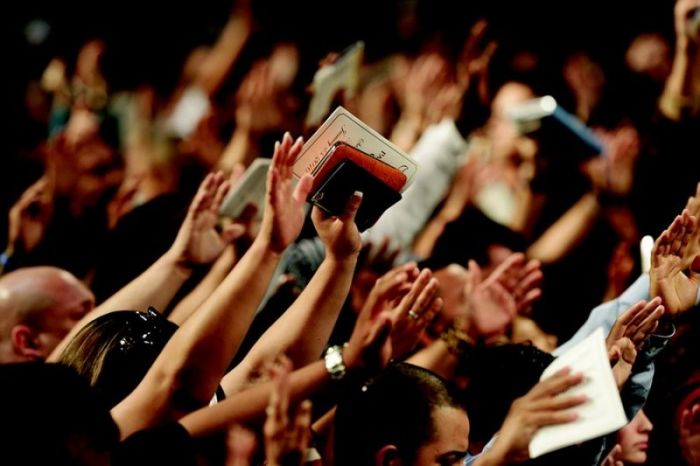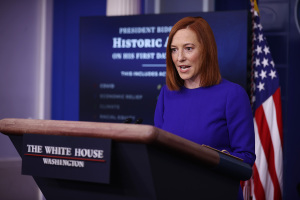Democrat Party Outreach to White Evangelicals Will Improve in 2020 Election, Clinton Adviser Predicts

WASHINGTON — The Democratic Party's outreach to left-leaning evangelicals will "be better" in the 2020 presidential election than the "miserable" job Hillary Clinton did in reaching out to that cohort in her unsuccessful 2016 presidential campaign, a former adviser to President Bill Clinton told journalists over the weekend.
Matthew Bennett, a political strategist who worked on both of Bill Clinton's presidential campaigns and also worked in the Clinton White House, spoke with reporters gathered for the inaugural Michael Cromartie Forum hosted by the Ethics and Public Policy Center in honor of their late and renowned colleague known for his influential work in guiding journalists toward a more nuanced coverage of religion.
Bennett, a co-founder of the center-left Third Way think tank established in 2005, joined center-right polling expert Henry Olsen from EPPC in fielding questions from the group of 13 media members during a Saturday morning discussion at the Dupont Circle Hotel on political issues and polling trends.
During the conversation, Emily Miller of the Religion News Service pointed out some commentary about one of the major failings of the Hillary Clinton campaign — it failed to reach out to faith values voters.
But since President Donald Trump has taken office, there has been much mobilization when it comes to left-leaning religious leaders signing joint declarations against Trump administration policies, and even hosting protests and other forms of public demonstrations. The panelists were asked if there was enough energy from the religious left to make an impact in the upcoming midterm elections.
"When I look at the religious left, I don't see it as a large force," Olsen, an EPPC senior fellow and a trusted commenter on polling trends, explained.
"When you take a look at the Democratic Party, it just proportionately relies on support from people who profess no religion. It tends do poorly among church-going Christians," he added. "You certainly have a religious element in the African-American community and you certainly have a minority of people in the Christian community but it doesn't strike me as a huge voter base outside of mobilizing the African-American community."
Bennett agreed but suggested that Hillary Clinton should have done a much better job in her campaign of reaching out to that group and predicts there will be a "correction" in that area in a Democratic presidential push for 2020.
According to exit polls, Clinton received just 16 percent of the white evangelical vote in 2016. By comparison, Democrat President Barack Obama received 21 percent of the born-again evangelical vote in 2012 and 24 percent of the born-again evangelical vote in 2008.
"The Clinton campaign did do a miserable job of this and there will be a correction around that outreach to particularly white evangelical Democrats — not a huge group — will be better in 2020 than it was before."
"Democrats always try to check the boxes — they go to religious African-Americans, they go to religious Latinos, which now are both Catholic and evangelical. But they tend to put religious people in the same kinds of small boxes that they put others in our coalition in," he continued. "You are African-American, or you're millenial, or you're LGBT or you're religious. If Democrats continue to approach voters that way, we will lose."
Bennett stressed that Democrats need to "craft a narrative that can be broadly useful" and used anywhere.
"When I worked for Bill Clinton, he would say everywhere, 'If you work hard and play by the rules, you should get a fair shake.' He would say that every single place he went, no matter what he was doing," Bennett said. "Hillary said a different thing in every place she went and she was nuanced and she was sophisticated and it was a disaster. So, I think that is true for religious Democrats as well."
One area in which many Democrats — especially religious ones — might feel out of step with their party is when it comes to LGBT issues or abortion. As another Democratic strategist detailed last week, some religious Democrats feel as though some of their opinions are "off limits" in their party that they feel is being overrun by the donor class.
Moderator Jon Ward of Yahoo News asked Bennett about the rapid rate of advancement of certain transgender initiatives that have occured over the last few years that have discomforted some in the party.
Bennett stressed that most "professional Democrats" believe that the party went "two ticks too far on the transgender rights issue in 2016." He explained that the Democrats "got out ahead of the country in ways that we did with gay marriage."
"As you recall in 2004, [GOP strategist] Karl Rove was ginning up gay marriage ballot initiatives as it was driving turnout for Republicans because Democrats will sway out ahead of the country," Bennett said. "People just weren't there yet. That obviously changed and changed with head-spinning speed. But, I think that probably was the case again in 2016 on the bathroom bills and transgender rights generally."
Bennett said that the transgender issue is "changing more slowly than gay marriage."
"Marriage, as you all well know, has a whole set of underlying questions and drivers that the bathroom bill really doesn't," he said. "Most people understand that they know someone who is gay or lesbian. A lot of people don't know people who are transgender."
Olsen chimed in by saying that sometimes it is not a matter of whether an issue is being pushed "too fast," but that it is "being made in a way that doesn't allow the people who are asked to change their views see themselves in the equation."
"A white person could see themselves in the Civil Rights Movement because the idea was 'we are all going to be people together,'" Olsen said. "Whereas, if it is made in a more identity way, there is a winner and a loser and the loser just has to lump it."
Considering that Democratic National Committee Chair Tom Perez said last April that it is "not negotiable" that Democratic candidates must support abortion rights, The Christian Post asked if it is possible in today's Democratic Party for pro-life Democrats to run for office.
Bennett said that although it is very hard for pro-life Democrats to run nowadays, there is now somewhat of a "cycle of desperation" from Democrats to retake the House of Representatives in the 2018 midterms that is "swamping every other imperative" for the party.
As Pew Research found last year that 22 percent of Democrats believe that abortion should be illegal in all or most cases, Democratic Congressional Campaign Committee chairman U.S. Rep. Ben Ray Luján of New Mexico clarified last July that there is "no litmus test" when it comes to abortion and that the party was seeking "candidates that fit the district."
"So, if there is a pro-life Democratic candidate in a pro-life district, you will see DNC behind him 100 percent with Pelosi's certain backing," Bennett said.
However, the days of prominent Democrats voicing full-throated opposition for abortion are just about over, Bennett said.
"[As far as] Gov. Bob Casey giving a speech at the [Democratic National] Convention saying, 'I am a proud, pro-life Democrat,' that is never going to happen again," Bennett said. "Our party has just moved too far from the day when you have a [faction] inside the party that is profoundly pro-life and would act that way in office."
"You have a lot of people like Sen. Tim Kaine [of Virginia] who will say, 'I am a devout Catholic and I think abortion is a sin but I will not vote that way as a senator,'" Bennett added. "I think that is what you are going to get from pro-life Democrats running for office for the most part."




























